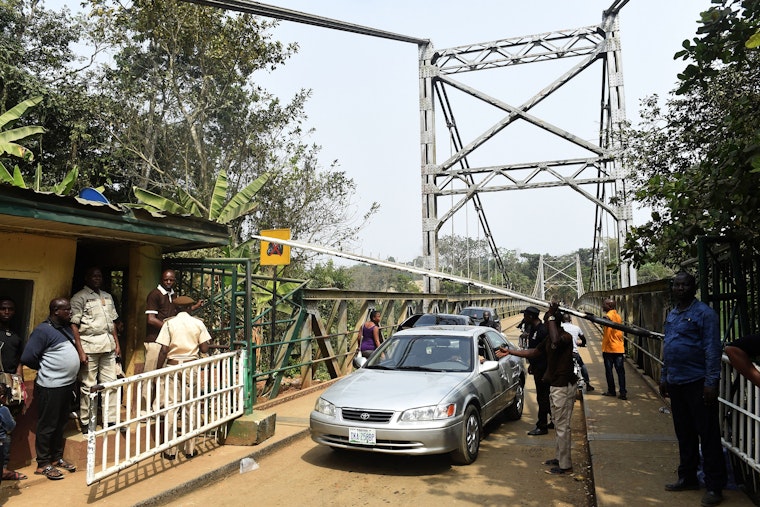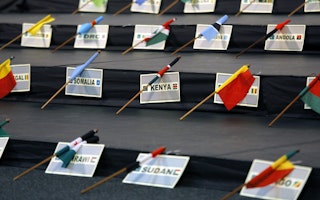Where Are the 47 Political Exiles Sent by Nigeria to Cameroon?
By Chidi Odinkalu & Tem Fuh Mbuh

Over the past few months, thousands of refugees from Cameroon have fled across the country’s western border into Nigeria, escaping an increasingly vicious conflict that has been largely unnoticed outside the region.
Hundreds of civilians have been killed; many more have been tortured, disappeared, or taken into custody by forces loyal to Paul Biya, the president of Cameroon—who is currently the longest-serving leader in Africa today, having held power for 35 years.
The trouble started when teachers and lawyers in the Cameroon’s minority Anglophone regions—who complained of being marginalized by the country’s Francophone majority—launched a mass protest. These complaints soon turned into more militant demands for greater self-determination, then became a secessionist demand for the creation of an independent (and Anglophone) state of “Ambazonia.”
Nigeria itself has reacted to the trouble by appealing for international aid to support the influx of refugees, and by showing itself ready to support its neighbor against the secessionist threat.
Unfortunately, that support has included a readiness to breach international law. In late January, the Nigerian government rounded up a group of 47 Cameroonian opposition members and sent them back to Yaoundé, Cameroon's capital. This was done despite the opposition members’ status as asylum seekers and refugees.
The group included Sisiku Ayuk Tabe, leader of the self-proclaimed interim government of Ambazonia—who, along with his supporters, was denounced as a terrorist by the Biya government. On January 17, 2018, he and many of the other 46 persons were attending a meeting in a hotel in the Nigerian capital of Abuja. They were abducted and detained, without charges and in secret, by hooded agents of Nigeria’s State Security Service. They were not allowed to see a lawyer or their families. Nine days later, without a court order or a thought to how they’d be treated upon arrival, Nigeria expelled the oppositionists to Cameroon.
On arrival in Yaoundé, the government of Cameroon—in secret—took the 47 into custody. On January 29, 2018, a spokesman for Cameroon confirmed that the government had custody of the group. Nothing further was heard until April 9, when Cameroon’s information minister said, “All of them are doing very well, all of them are in very good health, all of them are enjoying whatever is enshrined in our constitution.”
But since neither their families nor legal representatives have been allowed access to these people, there is no way to verify the truth of the government’s claim. For all practical purposes, they have disappeared.
Four of the 47 expelled had Nigerian nationality. Cameroon does not presently allow dual nationality, and Nigerian law prohibits the expulsion of its nationals. By expelling these four, in other words, Nigeria effectively rendered them stateless—in violation of clear international law.
Nigeria’s conduct is also an assault on the very foundations of international refugee and human rights law. The 1951 Convention Relating to the Status of Refugees, to which Nigeria is a leading party, prohibits the forced return—or “refoulement”—of a refugee “in any manner whatsoever to the frontiers of territories where his life or freedom would be threatened on account of his race, religion, nationality, membership of a particular social group, or political opinion.’’
But the responses of regional human rights institutions of the African Union, as well as of the United Nations High Commissioners for Human Rights and for Refugees, have so far been muted. This is a mistake; if only to avoid exacerbating other crises in Africa, these institutions should be more visible and active in defense of basic rights.
Regardless, it is necessary to verify the whereabouts and safety of these 47 individuals, and to guarantee them access to redress. Pending these steps, the United Nations organs should reaffirm the inviolability of the principle of nonrefoulement and require Nigeria—a country with tens of thousands of refugees of its own—to provide verifiable guarantees that it is prepared to comply with this vital international principle.
It is also necessary to hold Cameroon to account for the numerous human rights violations committed in the course of the Anglophone crisis, including for the enforced disappearance of the 47 persons sent back by Nigeria, as well as the continuing heavy-handed way that security operations in the Anglophone regions are conducted.
Chidi Odinkalu is senior team manager for the Africa regional work of the Open Society Justice Initiative.
Tem Fuh Mbuh is a program officer for the Open Society Initiative for West Africa.


